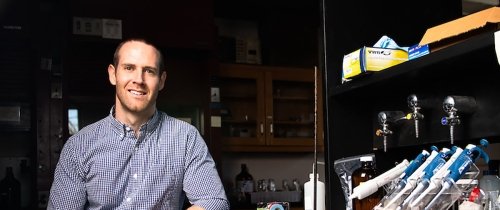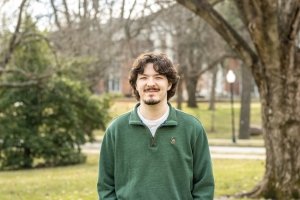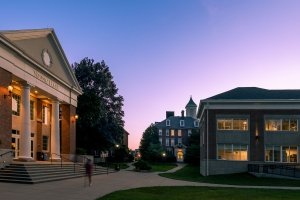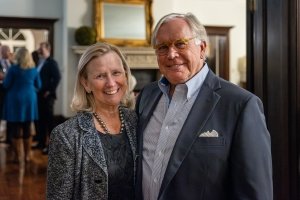
Centre College’s Daniel Scott receives $80,000 grant to develop new medical device for remote or underserved communities
Daniel Scott, assistant professor of chemistry, received the two-year grant from the Kentucky IDeA Networks of Biomedical Research Excellence (KY INBRE) to develop an inexpensive, easy-to-use diagnostic device system to enable rapid medical test results in less developed or remote areas. The proposed device system is intended to help people who live with limited access to medical care.
“This project is initiating a new vision to develop better diagnostics and monitoring for patients,” Scott said. “The devices we are working toward will be small and portable diagnostic tests that will give you rapid feedback. If you imagine them as similar to the at-home COVID tests many of us are familiar with, but for an array of different diseases and new ways to monitor a patient’s response to treatment.”
Scott explained that one reason rural or socioeconomically challenged communities are disproportionally affected by disease is because of the lack of testing services and capabilities, which are critical for early detection and disease management.
Scott’s new device will be inexpensive to make, and the results will be easy to understand for both trained and untrained personnel. “With the rise of telehealth opportunities, our diagnostic devices can be used by patients in the comfort of their own homes and expand the care that can be given remotely.”
KY INBRE grants are designed to build capacity for health-related and biomedical research in the Commonwealth of Kentucky. The award provides funding for Scott to conduct initial research and to develop multi-disciplinary collaborations with the goal of obtaining a larger multi-year grant from the National Institutes of Health (NIH).
“We are starting to work on the fundamental chemistry and biochemistry to make the devices work, and I have already connected with faculty in computer science to take the next step in our device creation,” he added. “As the project progresses, we will expand our collaborations to include others such as business and economics, and chemical and materials engineers. It is exciting to me see how so many academic disciplines are needed and can come together for a common goal.”
In the past, Scott has conducted research on developing new anti-cancer drugs and delivery vehicles to distribute the drugs and reduce the non-specific side effects associated with chemotherapy.
He has a long history of collaborating with his undergraduate students at Centre in his research. That will continue with this project.
“I want science to come to life for the students and for them to be excited about all of the possibilities,” Scott explained. “Particularly with this project, I hope some of our students that end up going to medical school will be some of the first to use our devices in the real world as practicing doctors.”
Support for submitting this grant proposal was provided a team of Centre faculty members, including Sponsored Research Specialist Kathe Andrews, Stodghill Professor of Biology and Biochemistry & Molecular Biology Steve Asmus and Associate Professor of Chemistry Kari Young.



